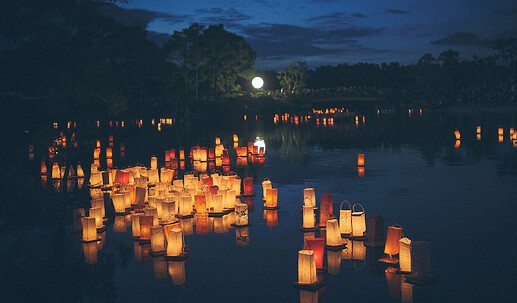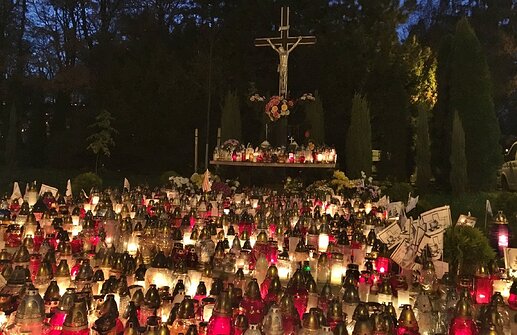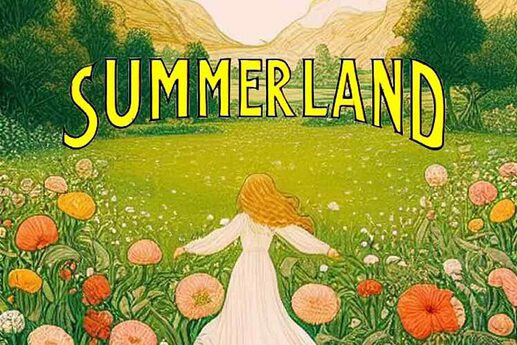While death is an important topic that can be empowering to explore, it can also be a difficult topic. Please remember to be mindful if you choose to engage in the discussion. Thank you!
Merry meet,
Autumn is arriving here in the Northern Hemisphere, and Mabon marks a season of bounty and harvest. But it is also a stepping stone on the waning journey that began at Litha. The length of the days are decreasing as we approach the darker part of the year. With this in mind, the beautiful burst of color that autumn brings seems like a final blaze - nature erupts in red, orange, and yellow before fading like ash into the muted colors we find around Samhain ![]()
This is a time of endings and the season of death - but although it can be somber, it doesn’t have to be a season of sadness. Holidays like Day of the Dead, Obon, Halloween, Samhain, and All Saint’s Day bring light and even joy to this time of year. Humanity has a long history of bringing light to the darkness and pushing beyond barriers to find answers and meaning ![]()
So, as the season of death approaches with all its darkness and its lights, we find ourselves interacting with the theme in many different ways. And if you’re similar to me, you may find yourself wanting to turn the next page to see what happens next - even after you’ve reached the metaphorical back cover of the book of life.
What happens when we die?
If this is a topic you’re interested in, then this space is here for you. Please know that this discussion does not claim any “right” or “wrong” answers about death, but rather aims to provide information and a welcoming space to help you explore the topic. I hope it, and any insights added in the comments by the coven, can help you build your own beliefs around death and the afterlife.
Death Across Traditions 
Humanity has long been fascinated, worried, scared, and even obsessed with finding out what happens after death. Because modern science focuses on the physical aspect of death, people turn to spiritual practices to find answers. Religions and other spiritual traditions often offer answers to death and provide explanations about an afterlife. Studying the answers offered by these paths can help one find which answers resonate (or don’t resonate) with them. So let’s take a look at a few common beliefs!
Disclaimer that these are general overviews gathered from sources - they may not adequately cover the varying beliefs of the many branching sects within a tradition. Please feel free to dig deeper with your studies if you see something that interests you.
Christianity
Most Christian traditions say that when the mortal body dies, the immortal soul or essence of a person goes to another realm. Those who were virtuous in life are granted entrance to a blissful heaven to be with their God for all eternity. On the other hand, sinners are sent to be punished in hell. There is also a liminal realm known as Purgatory in between heaven and hell where those with minor sins may find purification, and can then move on into heaven.
Christianity generally portrays the human soul as a unique and individual part of the person. Death is believed to be a final state where all of the deeds of life are tallied up and judgement is given, and the soul rests forever in their assigned afterlife.
Buddhism
Most forms of Buddhism believe that the life we live now is temporary and that all life exists in a cycle of life and death called samsara. The cycle is directed by karma, which rewards those with ethical behavior with better circumstances in their next life. On the other hand, those who act unethically are punished with worse circumstances in their next life. With this in mind, a driving goal in Buddhism is to escape the cycle of samsara and no longer be reincarnated. This is called Nirvana or enlightenment.
One variation is Zen Buddhism, which generally puts more empathize on the present moment (life) than what happens after death. However, some Zen Buddhists believe that through their training, they can achieve the goal of returning to peaceful nothingness.
Although some types of Buddhism believe in heavens and hells as different worlds that can be reincarnated into, the ideal afterlife is Nirvana. However, Nirvana is usually depicted as a state of mind as opposed to a realm.
Wicca
Wicca offers a mixture of both an afterlife and reincarnation. Wiccans believe in The Summerland - a different realm that can only be visited after death or via astral travel. The Summerland is usually depicted as a heavenly and happy place where souls may rest and enjoy time before they are ready to reincarnate.
One common misconception is that Wiccans view The Summerland as a final destination or a static realm. However, it’s important to understand that Wicca acknowledges the fluidity and cyclical nature of life, — see for example, the Wheel of the Year — and The Summerland is seen as a temporary stop in the soul’s journey. It is a place to reflect, learn, and prepare for the next phase of existence.
Another misconception is that The Summerland is a replica of earthly life. In reality, it is thought to be a realm of pure energy and spirit, where souls experience a profound connection with the divine and the natural world. It transcends the limitations of the physical realm and offers a space for souls to heal, grow, and reunite with loved ones.
From Spells8: The Summerland
As a nature-based religion, the Wiccan afterlife believes in cycles continuing after death. As such, death is not viewed as a finality or permanent state, but rather one phase on the spiritual journey.
There are many religions and traditions out there, too many to fit into a single post! If there is an afterlife or belief system that is important to you that wasn’t mentioned above, please feel free to share about it in the comments below.
You are also warmly invited to share your own thoughts and beliefs around death and the afterlife and their importance to your spiritual practice. Alternatively, feel free to explore this topic privately in your Book of Shadows or Journal.
Thank you very much to those who have read this far - I hope this space provides gentle support and hope for you during the season of endings and into the new season of beginnings.
In this life and whatever comes after, blessed be! ![]()
![]()
![]()
Sources:




